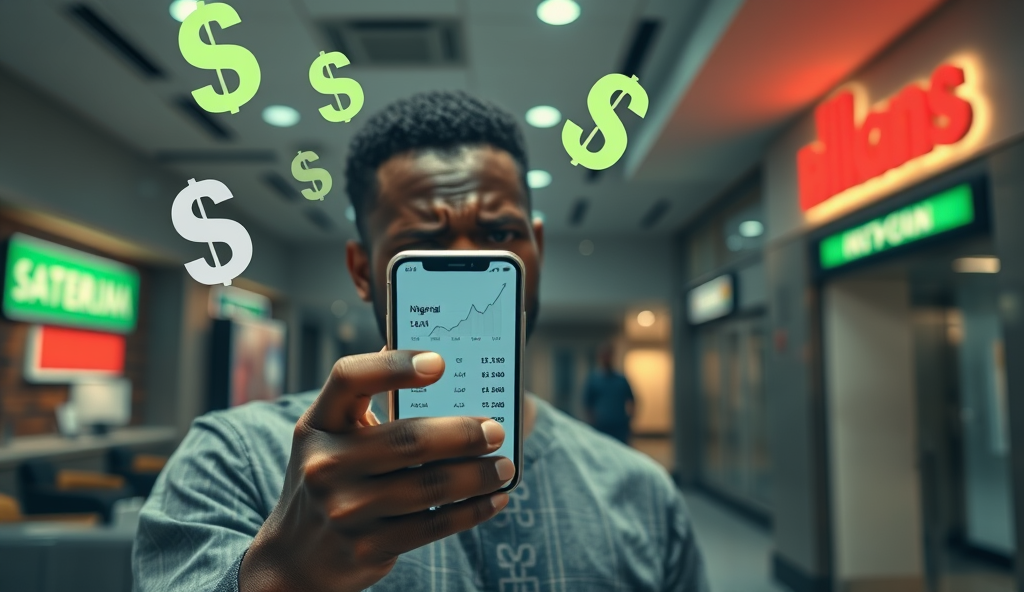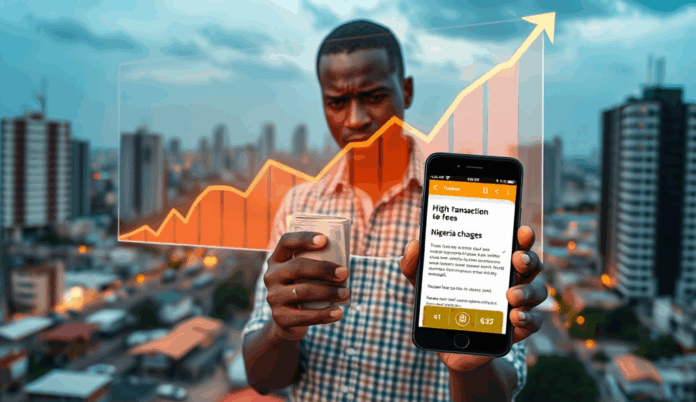Introduction to Digital Banking Fees in Nigeria
Digital banking fees in Nigeria have become an unavoidable part of financial transactions, with banks charging for services ranging from USSD transfers to mobile app transactions. A 2023 report by the Central Bank of Nigeria revealed that digital transaction fees account for nearly 15% of banks’ non-interest income, highlighting their growing significance in Nigeria’s financial ecosystem.
These fees vary across platforms, with USSD banking costs typically higher than mobile app transfers, creating confusion for many Nigerian customers. For instance, transferring ₦5,000 via USSD attracts ₦26.25 in fees compared to ₦10 for some bank apps, demonstrating how platform choice impacts costs.
Understanding these fee structures is crucial for Nigerian bank customers seeking to minimize expenses, which we’ll explore in detail by examining common digital banking charges next. The variations between banks and transaction methods present both challenges and opportunities for cost-conscious users.
Key Statistics

Understanding Common Digital Banking Fees in Nigeria
Digital banking fees in Nigeria have become an unavoidable part of financial transactions with banks charging for services ranging from USSD transfers to mobile app transactions.
Nigerian banks typically charge ₦52.50 for USSD transfers above ₦5,000, while mobile app transfers often cost ₦10-₦50 depending on the bank and transaction value, creating significant price disparities for similar services. Some banks like GTBank charge ₦6.98 for intra-bank transfers via their app, while Zenith Bank imposes ₦10 for the same service, demonstrating how fees vary even among top-tier institutions.
ATM withdrawals from digital accounts attract ₦35 per transaction after the fourth monthly withdrawal, with additional charges of 1-2% for interbank cash withdrawals. First Bank’s USSD service deducts ₦6.98 for balance checks, while Access Bank’s mobile app provides this service free, showing how fee structures differ across service types and platforms.
These variations in online banking charges highlight why Nigerians must compare platforms before transacting, a practice we’ll explore further when examining why these fees exist. Understanding these cost differences empowers customers to make informed decisions that reduce unnecessary expenses in Nigeria’s digital banking landscape.
Why Nigerian Bank Customers Pay Digital Banking Fees
Nigerian banks typically charge ₦52.50 for USSD transfers above ₦5,000 while mobile app transfers often cost ₦10-₦50 depending on the bank and transaction value creating significant price disparities for similar services.
Nigerian banks impose digital banking fees primarily to cover operational costs, including USSD infrastructure maintenance, mobile app development, and fraud prevention systems, with CBN data showing these expenses account for 60-70% of service charges. For instance, GTBank’s ₦6.98 intra-bank transfer fee helps offset the ₦1.2 billion annual technology budget reported in their 2022 financial statements.
Regulatory requirements like the Cybersecurity Levy and AMCON charges add 0.5% to transactions, explaining why interbank transfers cost more than intra-bank movements. Banks also factor in Nigeria’s high mobile data costs and unstable network infrastructure, which increase their service delivery expenses by 15-20% compared to global averages.
These fee structures ultimately reflect Nigeria’s unique banking ecosystem challenges, but as we’ll explore next, customers can employ smart strategies to minimize these costs. Understanding these underlying reasons helps explain the variations in online banking charges across platforms that we examined earlier.
Top Strategies to Avoid Digital Banking Fees in Nigeria
Nigerian banks impose digital banking fees primarily to cover operational costs including USSD infrastructure maintenance mobile app development and fraud prevention systems with CBN data showing these expenses account for 60-70% of service charges.
Given Nigeria’s unique digital banking ecosystem with its high operational costs, customers can significantly reduce fees by using intra-bank transfers (₦6.98 average fee) instead of interbank transfers (₦52.50 average), as shown in CBN’s 2023 fee structure analysis. Opting for bank apps over USSD codes also cuts costs, since apps have 30-40% lower transaction fees according to a 2024 NIBSS report.
Bundling transactions helps minimize charges—for example, transferring ₦50,000 once incurs lower fees than five ₦10,000 transfers, saving up to ₦200 monthly based on GTBank’s tariff. Scheduling bulk payments during off-peak hours (9pm-6am) further reduces network-related charges, which account for 15% of fees as noted earlier.
Leveraging fee-free thresholds—like Zenith Bank’s waiver on transfers below ₦5,000—and using digital wallets (OPay/PalmPay) for P2P transactions can eliminate up to 80% of routine banking fees. These practical steps create a bridge to our next discussion on selecting banks with the most favorable digital fee structures.
Choosing the Right Bank to Minimize Digital Banking Fees
Nigeria’s digital-first banks like Kuda ALAT and Opay dominate fee-free services with Kuda offering unlimited free transfers below ₦10,000 and zero account maintenance fees—a stark contrast to traditional banks charging up to ₦1,200 monthly for similar services.
Selecting a bank with competitive digital banking fees requires comparing fee structures, as variations exist even among tier-1 Nigerian banks—for instance, Access Bank charges ₦52.50 for interbank transfers while First Bank imposes ₦45, per CBN’s 2023 data. Digital-first banks like Kuda and ALAT often outperform traditional banks, offering lower mobile transaction fees and higher fee-free thresholds for online banking charges in Nigeria.
Prioritize banks with transparent pricing models, such as GTBank’s flat ₦52.50 transfer fee regardless of amount, unlike Zenith’s tiered system where fees increase after ₦500,000 transactions. Also consider banks like Stanbic IBTC that waive USSD banking costs for salary accounts, saving frequent users up to ₦1,500 monthly based on 2024 customer reports.
Your bank choice should align with transaction patterns—high-volume users benefit from Sterling Bank’s bulk transfer discounts, while occasional users maximize savings with UBA’s free transfers below ₦1,000. These strategic selections naturally lead to exploring completely fee-free digital banking services in Nigeria.
Utilizing Fee-Free Digital Banking Services in Nigeria
By implementing the strategies discussed earlier—such as using bank-specific USSD codes maintaining minimum balances and opting for fee-free digital wallets like Opay or Palmpay—Nigerian customers can significantly reduce unnecessary online banking charges.
Nigeria’s digital-first banks like Kuda, ALAT, and Opay dominate fee-free services, with Kuda offering unlimited free transfers below ₦10,000 and zero account maintenance fees—a stark contrast to traditional banks charging up to ₦1,200 monthly for similar services, according to 2024 NIBSS reports. These platforms also eliminate USSD banking costs, saving users an average ₦1,050 monthly compared to GTBank’s ₦10 per USSD session.
For businesses, Carbon’s free bulk transfers (up to 100 transactions daily) and Moniepoint’s zero-charge POS withdrawals present cost-effective alternatives to traditional e-banking service fees in Nigeria. However, always verify hidden conditions—some “free” services like PalmPay’s airtime purchases impose 1.5% fees above ₦5,000, per their 2024 pricing guide.
Tracking these fee-free thresholds ensures optimal savings, seamlessly transitioning to proactive monitoring of all digital banking transactions.
Monitoring and Managing Your Digital Banking Transactions
Regularly reviewing transaction histories helps identify unexpected charges, especially with tiered fee structures like PalmPay’s 1.5% airtime purchase fee above ₦5,000. Set up SMS or in-app alerts for transactions exceeding your digital banking fee thresholds, such as Kuda’s ₦10,000 free transfer limit.
Leverage built-in budgeting tools in apps like ALAT or Carbon to track cumulative monthly fees, preventing surprises from hidden charges on bulk transfers or POS withdrawals. Compare statements across platforms monthly, as traditional banks may still deduct ₦1,200 maintenance fees despite using digital alternatives.
Proactive monitoring creates opportunities to switch services strategically, like using Moniepoint’s zero-charge POS withdrawals instead of fee-laden ATM transactions. This disciplined approach naturally leads to optimizing mobile apps and USSD codes for further savings.
Leveraging Mobile Apps and USSD Codes to Reduce Fees
Mobile banking apps like Opay and Palmpay offer fee-free transfers below ₦10,000, while USSD codes (*894# for GTBank or *737# for Access Bank) provide lower charges than ATM withdrawals, typically ₦6.98 per transaction versus ₦35 ATM fees. These platforms also feature bulk payment discounts unavailable through traditional channels, with some apps waiving fees entirely for first-time users.
USSD banking remains crucial for Nigerians without smartphones, with Unity Bank’s *7799# charging just ₦4.50 per airtime purchase versus ₦52.50 via ATM. However, beware of hidden costs like Zenith Bank’s ₦20 USSD maintenance fee after three free monthly transactions, which budgeting tools can help track.
Understanding these digital cost structures prepares users to identify eligible waivers, like First Bank’s 50% discount on USSD transfers above ₦5,000—a natural segue into exploring broader fee exemptions.
Understanding Waivers and Discounts on Digital Banking Fees
Nigerian banks often offer temporary fee waivers during promotional periods, like UBA’s zero-charge policy on mobile transfers for the first three months of 2023 or Stanbic IBTC’s 30% discount on bulk payments above ₦50,000. These limited-time offers require monitoring bank announcements through official channels to maximize savings while active.
Some digital banking fee exemptions target specific customer segments, such as students enjoying free transfers on GTBank’s *737# USSD or pensioners accessing discounted transactions via First Bank’s digital platforms. Always verify eligibility criteria, as seen with Access Bank’s corporate account holders who get 100 free monthly transfers but pay ₦10 per transaction thereafter.
Regularly reviewing your bank’s digital fee structure helps identify new discount opportunities, like Polaris Bank’s recent reduction of USSD airtime purchase fees from ₦6.98 to ₦4.50—knowledge that smoothly transitions into staying updated on evolving policies.
Staying Updated on Digital Banking Fee Policies
Subscribe to your bank’s official email alerts and SMS notifications to receive real-time updates on fee changes, like Zenith Bank’s 2023 SMS notifications about revised USSD transaction charges. Follow verified social media pages of Nigerian banks, where announcements like Fidelity Bank’s temporary waiver of interbank transfer fees are first published before appearing on websites.
Bookmark your bank’s digital banking tariff page and review it quarterly, as demonstrated by Ecobank Nigeria’s 2024 update that moved bulk transfers above ₦500,000 to a lower fee tier. Set Google Alerts for phrases like “Nigerian digital banking fees update” to catch industry-wide changes like the CBN’s revised USSD pricing framework affecting all banks.
Join customer forums on platforms like Nairaland where users share experiences about sudden fee implementations, such as discussions that exposed Union Bank’s unannounced ₦50 charge for recurring transfers. This proactive monitoring positions you to adjust your banking habits before new charges take effect, naturally leading to implementing the smart fee-avoidance strategies covered in our conclusion.
Conclusion: Smart Ways to Avoid Digital Banking Fees in Nigeria
By implementing the strategies discussed earlier—such as using bank-specific USSD codes, maintaining minimum balances, and opting for fee-free digital wallets like Opay or Palmpay—Nigerian customers can significantly reduce unnecessary online banking charges. For instance, GTBank customers avoid transfer fees by using *737#, while Zenith Bank users leverage free interbank transfers via their mobile app.
Monitoring transaction patterns and leveraging bank promotions, like First Bank’s fee waivers for bulk transfers, further optimizes cost savings. Always compare mobile transaction fees across platforms, as some Nigerian banks charge lower rates for intra-bank transfers than interbank transactions.
Staying informed about CBN’s fee policies ensures you don’t overpay for services like ATM withdrawals or USSD banking.
Ultimately, proactive account management and strategic use of digital tools can help Nigerians navigate the complexities of e-banking service fees. As fintech solutions evolve, adopting these practices will remain crucial for minimizing costs while maximizing convenience in Nigeria’s digital banking landscape.
Frequently Asked Questions
Which Nigerian bank offers the lowest fees for USSD transfers?
GTBank charges ₦6.98 per USSD transfer while Zenith Bank imposes ₦10 – compare using the CBN's 2023 fee structure guide.
How can I avoid paying ₦52.50 for interbank transfers in Nigeria?
Use mobile apps like Kuda or Opay which offer free transfers below ₦10,000 instead of USSD codes for interbank transactions.
What's the cheapest way to check my account balance digitally?
Access Bank's mobile app provides free balance checks while First Bank charges ₦6.98 via USSD – always use your bank's app when possible.
Can I reduce ATM withdrawal fees from my digital account?
Yes – use Moniepoint's zero-charge POS withdrawals or schedule bulk cash withdrawals during off-peak hours to minimize charges.
Which digital banking service offers completely free bulk transfers in Nigeria?
Carbon provides free bulk transfers up to 100 transactions daily while traditional banks charge per bulk item – ideal for businesses.


